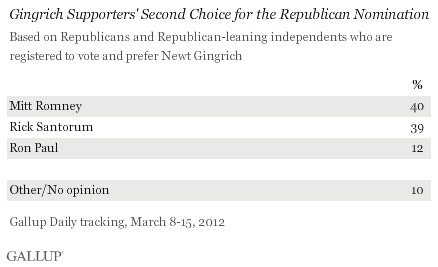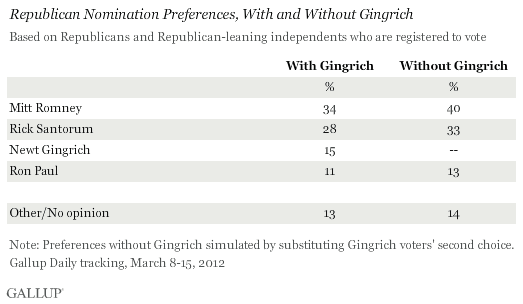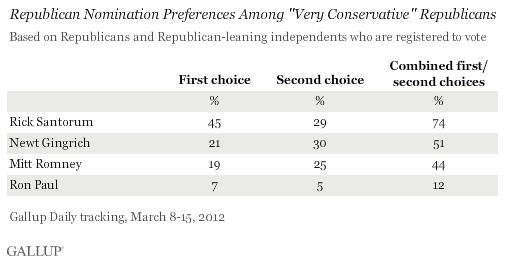PRINCETON, NJ -- Republican voters who prefer Newt Gingrich for the party's 2012 presidential nomination are as likely to name Mitt Romney as their second choice as they are to name Rick Santorum, suggesting the race would not tilt in Santorum's favor if Gingrich dropped out.

These results are based on Gallup Daily tracking interviews conducted March 8-15 with more than 1,900 Republican registered voters, including a sample of 290 Gingrich supporters.
Some conservative Republicans have called for Gingrich to drop out of the race on the assumption that conservative primary voters would then unite behind Santorum as the conservative alternative to the more moderate Romney. But Gallup data indicate that Gingrich voters would not be likely to coalesce behind Santorum, suggesting that factors other than candidate ideology may be attracting voters to Gingrich, Santorum, and Romney.
Gallup can simulate Republican preferences without Gingrich in the race by removing Gingrich votes and reassigning them to his voters' second-choice candidate. The results of this procedure suggest that national GOP preferences would change little if Gingrich dropped out. The reconfigured preferences show Romney getting 40% of the vote and Santorum getting 33%. That seven-percentage-point Romney lead is essentially the same as the six-point (34% to 28%) Romney lead in March 8-15 interviewing with Gingrich support included.

Romney Fares Nearly as Well as Gingrich Among "Very Conservative" Republicans
On a national basis, it is not Gingrich and Santorum who are dividing the conservative vote. Rather, it is Romney (33%) and Santorum (33%) tying for the lead among conservative Republican voters, with Gingrich further back, at 16%.
Gingrich does better among the smaller group of Republican voters who describe their views as "very conservative," getting 21% of the vote among this group, although it is nearly identical to Romney's 19%. Santorum is the clear favorite of very conservative Republicans, at 45%.
Very conservative voters' second choices break 30% for Gingrich, 29% for Santorum, and 25% for Romney. So while Romney certainly is not the favorite candidate of this group, nearly half (44%) rank him as either their first or second choice, only slightly behind Gingrich's 51%.

Thus, Santorum may not benefit much from Gingrich dropping out because the most conservative voters already support Santorum to a large degree, and Gingrich's appeal to this group is not substantially greater than Romney's.
Implications
If two candidates for a presidential nomination compete in the same ideological space, it would make sense that if one dropped out that the other would benefit. But that does not appear to be the case for the 2012 Republican nomination. While Gingrich and Santorum are thought to be competing for the same conservative voters, it is more the case that Gingrich, Santorum, and Romney are competitive among conservatives. For many Gingrich supporters, Romney -- not Santorum -- would be their fallback option if Gingrich dropped out.
This suggests that Republican nomination preferences are not purely a function of ideology. For example, the candidates' records and experience may attract voters to their candidacy. In a year in which the economy is the top issue for voters, Romney's extensive business background is a major plus. Perceived electability could play a role, with Romney generally faring better against Barack Obama than either Gingrich or Santorum. Momentum in the primaries could also be a factor, and Romney's status as the leader for the nomination could be helping to boost his support. Last, voters may choose to support a candidate because of certain aspects of his personality or campaign style.
Thus, for Santorum to overtake Romney, it may not be as simple as picking up additional support from Gingrich voters should the former speaker of the House drop out, since Romney would likely benefit at least as much as Santorum. Rather, Santorum would also likely need to cut into Romney's current base of support to gain ground on the frontrunner.
Survey Methods
Results for this Gallup poll are based on telephone interviews conducted March 8-15, 2012, on the Gallup Daily tracking survey, with a random sample of 1,947 Republicans and Republican-leaning independents, aged 18 and older, living in all 50 U.S. states and the District of Columbia who are registered to vote.
For results based on the total sample of Republican registered voters, one can say with 95% confidence that the maximum margin of sampling error is ±3 percentage points.
For results based on the total sample of 290 Newt Gingrich supporters, one can say with 95% confidence that the maximum margin of sampling error is ±7 percentage points.
Interviews are conducted with respondents on landline telephones and cellular phones, with interviews conducted in Spanish for respondents who are primarily Spanish-speaking. Each sample includes a minimum quota of 400 cell phone respondents and 600 landline respondents per 1,000 national adults, with additional minimum quotas among landline respondents by region. Landline telephone numbers are chosen at random among listed telephone numbers. Cell phone numbers are selected using random-digit-dial methods. Landline respondents are chosen at random within each household on the basis of which member had the most recent birthday.
Samples are weighted by gender, age, race, Hispanic ethnicity, education, region, adults in the household, and phone status (cell phone only/landline only/both, cell phone mostly, and having an unlisted landline number). Demographic weighting targets are based on the March 2011 Current Population Survey figures for the aged 18 and older non-institutionalized population living in U.S. telephone households. All reported margins of sampling error include the computed design effects for weighting and sample design.
In addition to sampling error, question wording and practical difficulties in conducting surveys can introduce error or bias into the findings of public opinion polls.
For more details on Gallup's polling methodology, visit www.gallup.com.
